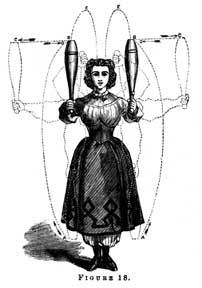 There are days when all I want to do is lie in bed and stream films until sundown. It’s not necessarily because I feel blue, just unmotivated, or – why not admit it? – just plain lazy. I’m just not feeling inspired. Of course I always have the choice of not writing, but experience has taught me that not writing ultimately feels worse than actually writing, just like I know that if I eat a whole tub of ice cream, I’ll regret it by the time the spoon scrapes the bottom of the carton. On days like those, I pretend writing is like an exercise routine. Exercise has taught me a lot about writing. After all, they have a lot in common.
There are days when all I want to do is lie in bed and stream films until sundown. It’s not necessarily because I feel blue, just unmotivated, or – why not admit it? – just plain lazy. I’m just not feeling inspired. Of course I always have the choice of not writing, but experience has taught me that not writing ultimately feels worse than actually writing, just like I know that if I eat a whole tub of ice cream, I’ll regret it by the time the spoon scrapes the bottom of the carton. On days like those, I pretend writing is like an exercise routine. Exercise has taught me a lot about writing. After all, they have a lot in common.
Just do it. Yes, writing is hard. Stop your moaning, fire up your laptop (or open up your notebook), sit your ass down and get to work. Just like exercise, the first 15 minutes –okay, the first 60 minutes — are the hardest.
Gentle consistency. Exercise will only yield results if you’re consistent. A 30-minute daily workout will make you stronger over the course of a year than if you go full-throttle once every couple of months. Similarly, if you only have time for or energy to write a page a day, you’ll still end up with a 365-page book by the end of a year. Most books are written slowly over time. So if you can’t be like Zola and write for 12 hours straight every day, don’t despair.
Writing is a muscle. After four years of writing screenplays, I recently decided to go back to short fiction. The transition from crafting spare descriptions for scripts to having to describe every scene in full sensory detail has been tough. I felt just like I did on my first run after 18 months off to recover from an injury: out of shape. The act of laying out each sentence was strenuous and I felt the strain of coming up with the right word as keenly as I felt each step on an uphill jog. I knew I had to persevere to get my mojo back. Writing is hard. Just like you wouldn’t expect to win a marathon without training, don’t expect to write a novel without putting in the long, tedious, arduous hours of work. And know that, most likely, it’s going to be really tough at first.
Get into it. You’ll never become athletic if you keep looking at the clock to see how much longer you have to go at it, and you’ll never get any writing done if you keep looking up to check your iPhone. Sure, we all do it from time, but the only way to tough it out is to enjoy the process and it starts by fully immersing yourself in the experience. Breathe in the scent of the blossoming lilacs, hear the crunch of your feet on the dirt, feel the breeze in your hair and relish the sweat pouring from your brow and before you know, you’ll lose track of time and just run. Same with writing. The very act of describing everything in detail also has a hypnotic effect on you while you write. Do this well and whatever you feel as you construct the scene, whether it’s fear, sadness, melancholy, or laughter, your reader will feel it as well.
Have a mantra. Sometimes a race will get really challenging. It’s hot, your thighs burn, your heart is beating too hard, the finish line is miles away, and you feel like you’ve got nothing left. You’re gripped with an overwhelming fear that you won’t make it. Runners call this “the wall,” but even if you never ran more than a mile, I’m sure you’ve hit a psychological wall at some point in your life. My strategy past the wall is to forget everything else and focus all of my attention on a mantra. (Usually “slowly, slowly catch the monkey,” or, “slow and steady wins the race.”) I just keep repeating it until I finally catch my second win. I find that for a writer the scariest moments come either before or after actually doing the work. There’s the panic set off by a blank page, the stage fright of reading in public, the despair of constant rejection, or the crushing fear of ridicule when your work finally gets published. Mantras work wonders to calm the nerves in these instances as well. I discovered this recently when I had to take a client to small claims court. Not only was I already nervous, it was a cold, rainy, windy day and my umbrella broke on my way to the courthouse, the client kept pressuring me to dismiss the suit, I spilled coffee on the documents for the judge, and it looked like I was going to have to come back every day for the rest of the week. Just when I was about to lose it, I realized that if I broke down, I’d really be lost. So, I recited the Serenity Prayer in my head – non-stop for a full 45-minutes until they finally called my name and I had to present my case. Writing and running are incredibly challenging. Mantras will help you recover your strength when you falter.
Know when to rest. Muscles get stronger during the recovery phase so getting regular rest between workouts is the only way to truly get fit. Same goes with creativity. You can’t push the Muse. Personally, I find that if I’m having a hard time writing a passage and I’ve struggled for hours without getting nowhere, then it’s time to take a break. It helps to have a day in between so I can sleep on something (particularly if it’s paid work and I’m really stuck). After I finish a piece, I put it in a drawer for anywhere between a day or a month. Fresh ideas and new perspectives emerge after a long break.
Writing and exercise naturally complement and feed each other. After a few hours of living solely in our mind, nothing will feel more rewarding than a hard workout. By the same token, when the words won’t flow, nothing will release them better than a long run or a leisurely stroll. And, lastly, you gotta be tough to do both.
